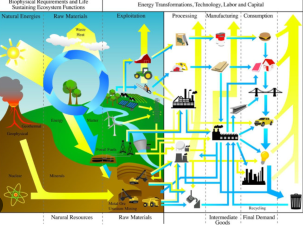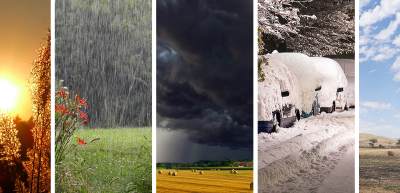In today's society, ecological and environmental protection and economic growth are like two ends of a scale, and maintaining this balance is a major challenge. We all hope to live in a world with a beautiful environment and a prosperous economy, but the relationship between the two appears to be complex.
On the one hand, economic growth can provide financial and technological support for environmental improvement; on the other hand, irrational economic development methods can cause serious damage to the ecological environment. So, how can we find this balance?
The Contradiction and Unity Between the Two
Economic development and ecological balance are a unity of opposites. To maintain and improve the conditions for survival and development, humans must obtain materials and energy from the environment and participate in the flow of materials and energy conversion in nature through production and consumption. In this process, economic development affects the balance of natural ecology. Since the 1950s, the world's population explosion, rapid economic development, and irrational exploitation of natural resources have led to the deterioration of the ecological environment in many countries and even worldwide. This deterioration of the ecological environment has, in turn, damaged the basic conditions for industrial and agricultural production and restricted economic development. This phenomenon reflects the contradiction between economic development and ecological balance. However, if the economy develops rationally and in accordance with objective laws, it can avoid harming the ecological balance and create conditions for its improvement. A well-maintained ecological balance not only enhances the regenerative capacity of natural resources, ensuring their sustainable use, but also promotes sustained and stable economic growth. Therefore, economic development and ecological balance are unified and mutually reinforcing.

The Current State of Ecological Environmental Protection and Economic Growth
Challenges Facing the Ecological Environment
- Severe Environmental Pollution
Regarding air pollution, many cities are often shrouded in smog. Large amounts of industrial waste gas, motor vehicle exhaust, and coal combustion cause excessive levels of pollutants such as particulate matter, sulfur dioxide, and nitrogen oxides in the air. These pollutants not only affect people's respiratory health but also severely impair visibility, causing significant inconvenience in transportation and daily life.
Water pollution is also a serious issue. Industrial and domestic wastewater, discharged directly into rivers, lakes, and seas without effective treatment, has deteriorated the quality of many water bodies. Some rivers have become turbid and smelly, resulting in the death of fish and other aquatic life, damaging the ecological functions of water resources, and compromising the safety of drinking water.
Soil pollution is also a cause of concern. The long-term use of chemical fertilizers and pesticides, as well as the indiscriminate storage of industrial waste, has led to excessive levels of heavy metals in the soil, reducing soil fertility and impacting crop yields and quality, thus threatening the balance of the entire ecosystem.
- Ecosystem Destruction
Forest area is continuously decreasing, with large numbers of trees being cut down for timber processing, construction, and other purposes. Forests are the "lungs" of the Earth. Their decline reduces their ability to absorb carbon dioxide, exacerbating the greenhouse effect. It also destroys the habitats of many plants and animals, leading to a decrease in biodiversity.
Wetlands are gradually shrinking. Wetlands provide important ecological functions such as climate regulation, water purification, and biodiversity conservation. However, due to reclamation, urban development, and other factors, wetland area is shrinking, and their ecological services are also weakening.
Biodiversity is facing a crisis, with many rare species on the verge of extinction. Human activities, such as habitat destruction, invasive species, and overhunting, have led to a sharp decline in the number of species on Earth, challenging the stability of ecosystems.
Economic Risks Caused by Ecological Destruction
- A degraded ecological environment can lead to a series of serious economic problems. The first is the impact on agriculture. Soil pollution can lead to reduced crop yields and poor quality. For example, crops grown on land contaminated by heavy metals may contain excessive levels of harmful substances and fail to meet food safety standards. This not only results in poor sales but also damages the reputation of the agricultural products. Furthermore, some specialty agricultural sectors that rely on a healthy environment, such as organic farming and ecotourism agriculture, will suffer severe losses if the environment deteriorates, leading to reduced income for farmers.
- Impact on Industry: While some highly polluting enterprises may generate short-term economic benefits, long-term ecological degradation will increase operating costs. For example, companies may need to spend more on wastewater and exhaust treatment and respond to environmental inspections. Furthermore, as public awareness of environmental protection increases, demand for products that do not meet environmental standards will decrease, impacting companies' market share.





